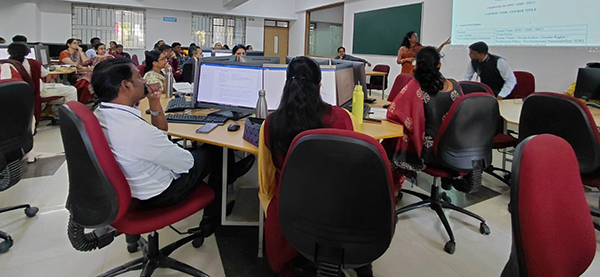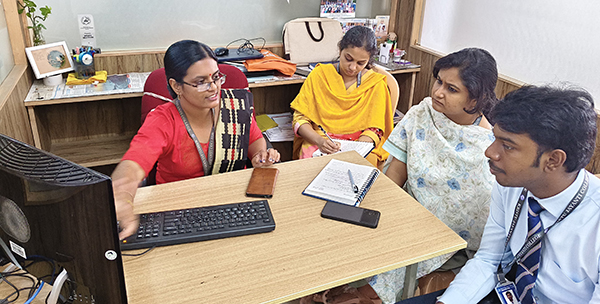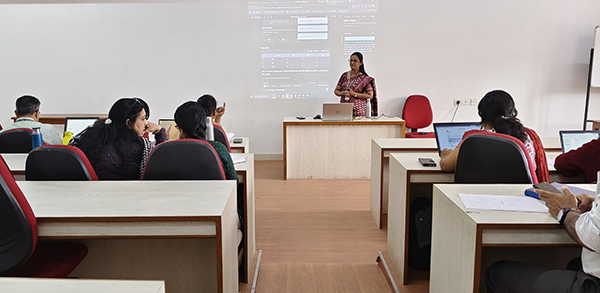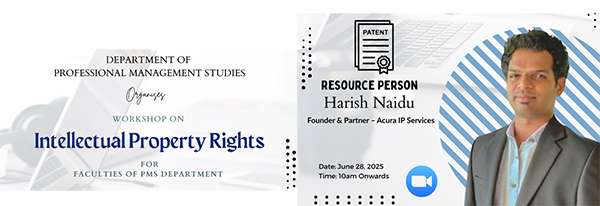
Faculty Enrichment Programme
Ameliorate ’25, A Seven-day Faculty Development Programme
Date: 22 to 29 October 2025
The Department of Professional Management Studies organized AMELIORATE ’25, a seven-day Faculty Development Programme (FDP) focused on “Educational Transformation: Integrating AI Teaching Pedagogy and Research,” held from 22nd to 29th September 2025. The programme aimed to empower faculty members with cutting-edge knowledge and hands-on exposure to Artificial Intelligence applications in teaching, curriculum, assessment, and academic research. A total of 234 faculty members benefited from the programme, including 36 in-house participants and 198 external participants from various reputed institutions across India.
The FDP brought together distinguished resource persons who delivered expert sessions on diverse themes: AI concepts and opportunities, AI-enabled pedagogy, curriculum design, AI in academic research, ethical AI practices, project-based learning using AI tools, and leveraging AI for scientific research. Each session enriched participants with conceptual clarity, practical tools, case studies, hands-on demonstrations, and discussions on emerging trends and implementation challenges. The programme emphasized how AI can personalize learning, automate assessment, accelerate research, and support data-driven academic decision-making, while also highlighting the need for ethical and responsible AI use.
Participants gained insights into adaptive learning technologies, intelligent tutoring systems, digital teaching tools, automated assessment platforms, AI-supported curriculum mapping, literature review automation, predictive analytics, and research visualization tools. Special focus was placed on integrating AI into project-based learning and fostering creativity, critical thinking, and innovation among students. The ethical dimension of AI—data privacy, fairness, transparency, and algorithmic accountability—was emphasized to ensure responsible adoption of technology in education.
The programme received overwhelmingly positive feedback, with high ratings for resource persons, content relevance, scientific sessions, event management, and overall execution. Participants appreciated the practical value of the sessions and the opportunity to engage with experts and peers from multiple disciplines and institutions. The FDP successfully created a collaborative platform for knowledge sharing, networking, and the exchange of best practices.
The FDP significantly enhanced the AI literacy of faculty members, empowering them with actionable strategies to integrate AI into pedagogy, curriculum, and research. Participants reported improved confidence in using AI tools, designing AI-enhanced learning environments, and adopting innovative teaching and assessment practices. The programme successfully fostered a community of AI-aware educators prepared to lead educational transformation in their institutions.
Curriculum Workshop for faculty members
Date: 10 October 2025
The Department of Professional Management Studies and the Department of Management, under the School of Business and Management, Kristu Jayanti (Deemed to be University), organised a Curriculum Workshop for faculty members of the Department of Management and Professional Management Studies on 10 October 2025 at 11:00 a.m. in the H2 Lab, Second Floor, Humanities Block. 49 faculties from the Department of Management and the Department of Professional Management Studies attended the workshop. The workshop aimed to strengthen the academic framework and pedagogical design of the management programmes, aligning them with the university’s vision of excellence in higher education. It provided a collaborative platform for faculty members to review, update, and redesign the curriculum to meet current industry trends, emerging technologies, and contemporary educational standards. The session was facilitated by two esteemed resource persons, Dr Jisha V.G., Head, Department of Professional Management Studies, and Mr Suku T. Samuel, Head, Department of Management. Both resource persons shared valuable insights on curriculum innovation, academic planning, and effective delivery mechanisms to enhance student engagement and learning outcomes.
Dr Jisha V.G. emphasised the importance of maintaining academic rigour while integrating industry relevance into the curriculum. She discussed strategies for revising course content, incorporating experiential learning components, and aligning course objectives with programme outcomes and programme-specific outcomes. She also highlighted the need to align course content with the graduate attributes. Mr Suku T. Samuel focused on the significance of outcome-based education and the continuous process of curriculum development. He elaborated on assessment rubrics, programme mapping, and the use of digital tools for effective teaching and evaluation. His session encouraged faculty members to adopt innovative teaching methodologies that nurture critical thinking, creativity, and problem-solving skills among students. The interactive workshop fostered collaboration among faculty members, enabling the exchange of ideas and best practices. The workshop concluded with an open discussion where participants shared feedback and suggestions for refining course structures, learning objectives, and evaluation mechanisms. The Curriculum Workshop served as an important step toward continuous quality enhancement in teaching and learning. It reaffirmed the School of Business and Management’s commitment to academic excellence and its proactive approach in adapting to evolving educational and industry landscapes.

Workshop on Learning Management System
Date: 19 July 2025
A comprehensive workshop on Learning Management System (LMS) was conducted for the new faculty members of the Department of Professional Management Studies to familiarize them with the Four-Quadrant Approach to digital content creation and delivery. The session aimed to promote blended and outcome-based teaching methodologies aligned with University standard norms was organised. New teachers were guided on preparing and uploading structured lesson notes in textual format. Focus was placed on content clarity, alignment with learning outcomes, and integrating images, references, and reading materials for better student comprehension. Followed by it the use of discussion forums as a tool for encouraging student engagement and peer learning. Techniques for moderating discussions, initiating reflective questions, and promoting collaborative thinking were demonstrated. The workshop successfully empowered the newly joined faculty members with the required skills to integrate technology into teaching. The four-quadrant model proved to be a structured and holistic method of course delivery, promoting both accessibility and effectiveness in learning.

Faculty Enrichment Programme on AI Tools for Research
Date: 01 July 2025
The Department of Professional Management Studies conducted a Faculty Enrichment Programme titled “AI Tools for Research” on July 1, 2025. The workshop aimed to enhance faculty members’ understanding of cutting-edge AI tools for research, academic writing, data analysis, and efficient literature access. Dr. A J Excelce, Associate Professor, led the session and provided hands-on training on platforms such as Connecting Papers, Julia AI, and ResearchRabbit.
The participants reported improved skills in managing research workflows, analyzing data, and integrating AI tools in teaching and supervision. The workshop fostered a robust research environment and promoted the use of technology in academic settings. Feedback from attendees indicated a high level of satisfaction, with 100% agreement on the workshop’s relevance and applicability.
The event was well-received, and most participants expressed interest in attending advanced sessions in the future.

Workshop On Intellectual Property Rights (IPR)
Date: 28 June 2025
The online workshop on Intellectual Property Rights (IPR), held on 28th June 2025, brought together faculty members eager to learn how IPR influences modern scholarship and research culture, coordinated by Dr. A. J. Excelce and Dr. Jagdeep Singh. The event included twenty-two in-house faculty and aimed to boost innovation while familiarizing attendees with the legal steps needed to safeguard their creative output.
Mr. Harish Naidu, founder and partner at Acura IP Services, led the morning session from 10:00 to 11:00 and opened with real-world examples that made complex terms feel accessible. He walked participants through the main types of intellectual property-Patents, Copyrights, Trademarks, Geographical Indications, and Trade Secrets and explained the step-by-step process for filing patents or securing a copyright. His practical tips on timelines, costs, and common pitfalls were particularly well received.
The workshop's purpose was achieved, as participants developed a better understanding of IPR and its value to research. Faculty also improved their ability to recognize and safeguard different forms of intellectual property, learned how to apply legal contexts to them, and understood the ethical considerations underlying IPR. Finally, the session helped with thoughts of incorporating IPR into their teaching and research practices, consistent with national objectives for innovation.
Overall, the workshop provided a valuable context to support the development of the faculty's capacity, equipping them with both the basic knowledge, and practical components of the evolving field of intellectual property. The participants indicated they appreciated the informative and stimulating session, which helped make the workshop a great academic endeavor.

Ameliorate '24
Date: 21 to 28 October, 2024
The digital revolution has transformed every facet of education, redefining how knowledge is imparted, accessed, and utilized. The session on Overview of the Digital Revolution in Education provided an in-depth understanding of how technological advancements are reshaping the educational landscape, fostering innovation, inclusivity, and accessibility. This session offered participants a comprehensive perspective on the evolving dynamics of education in the digital era. Dr. Panchanatham's extensive experience in higher education administration and his visionary leadership make him an authoritative voice on this subject. The discussion covered the pivotal role of digital tools, platforms, and resources in transforming traditional teaching-learning models. It explored the integration of artificial intelligence, online learning environments, virtual reality, and data analytics to enhance personalized learning and bridge the digital divide. The session highlighted challenges, such as ensuring equitable access and maintaining educational quality, while embracing the opportunities presented by technological disruption.
Session II:
Title: Digital pedagogy for active learning and student engagement
Resource person: Dr. K Thiyagu, Assistant Professor, Department of Education, Central University of Kerala
The session on Digital Pedagogy for Active Learning and Student Engagement empowered educators with innovative strategies to foster active participation and meaningful learning experiences in a digital-first environment. The rapid evolution of technology has transformed traditional teaching methodologies, necessitating a shift towards integrating digital tools and pedagogical practices that resonate with the tech-savvy learner. The resource person brought a wealth of knowledge and expertise in contemporary educational practices. His insights on leveraging digital tools for collaborative learning, critical thinking, and interactive engagement provided participants with actionable strategies to enhance their teaching approaches. The session explored the significance of digital pedagogies, effective tools for fostering interaction, and techniques to ensure inclusive and participative classrooms in both physical and virtual settings. It also shed light on methods to sustain student motivation, measure engagement, and adapt teaching practices for diverse learning needs.
Session III:
Title: Usage of AI and big data analytics in educational research
Resource person: Dr. S. Lara Priyadharshini, Assistant Professor & Head (i/c), PSGR Krishnamal College for Women, Coimbatore , TamilNadu
The integration of Artificial Intelligence (AI) and Big Data Analytics has revolutionized educational research, enabling data-driven insights, personalized learning, and improved decision-making. The session on Usage of AI and Big Data Analytics in Educational Research delved into the transformative potential of these technologies in addressing complex educational challenges and enhancing research methodologies. The resource person brought a wealth of expertise in leveraging cutting-edge tools for academic and institutional advancement. Her practical insights and scholarly acumen provided participants with a nuanced understanding of how AI and big data can be harnessed effectively in educational contexts. This session explored the application of AI algorithms for predictive analytics, personalized learning paths, and adaptive assessments. It also highlighted the role of big data in identifying trends, patterns, and correlations in large-scale educational datasets. Ethical considerations, challenges in data collection, and the importance of maintaining data privacy and security were also addressed.
Session IV:
Title: Assessment and Evaluation in Digital Education
Resource person: Dr. Joseph Charles Thamilmanimaran, Associate Professor & Head, School of Management, Kristu Jayanti College, Bangalore.
Assessment and evaluation are critical components of the teaching-learning process, particularly in the evolving digital education landscape. The session on Assessment and Evaluation in Digital Education focused on innovative strategies, tools, and best practices to measure learning outcomes effectively in virtual and hybrid environments. The resource person brought extensive experience and expertise in academic assessment methodologies and digital learning frameworks. His insights guided the participants in understanding and implementing assessment techniques that align with the demands of the digital era. This session covered topics such as designing effective online assessments, leveraging technology for formative and summative evaluations, and ensuring academic integrity in digital platforms. It also focused on the challenges of evaluating critical thinking, creativity, and collaborative skills in an online setting. Participants gained exposure to digital tools such as learning analytics, AI-based assessment platforms, and methods for providing timely and constructive feedback. This session equipped educators with practical knowledge to enhance their assessment strategies, ensuring they remain relevant and impactful in a technology-driven educational ecosystem.
Session V :
Title: Enhancing Research Visibility and Citations
Resource person: Dr. Poulami Saha, Assistant Professor, School of Management, Sr. Aloysius Deemed to be University, Mangalore
In today’s competitive academic landscape, increasing the visibility and impact of research is essential for advancing scholarly contributions and fostering collaborations. The session on Enhancing Research Visibility and Citations provided researchers with effective strategies and tools to improve their academic footprint and citation metrics. This session offered practical insights into disseminating research through appropriate channels and leveraging digital platforms for maximum outreach. Dr. Saha's expertise in academic publishing and research management helped the participants understand the position their in the global research community. Key topics included selecting high-impact journals, optimizing research profiles on platforms like Google Scholar, Research Gate, and ORCID, and using social media and academic networks to promote research. The session also delved into strategies for crafting impactful abstracts, titles, and keywords, as well as understanding citation behaviors and ethical considerations in publishing. This session equipped participants with actionable knowledge to enhance their research's visibility, foster academic engagement, and contribute significantly to their respective fields.
Session VI :
Title: Research Collaboration and Networking in the Digital World
Resource person: Dr. Violet Glady P, Assistant Professor, Stella Maris College, Chennai.
The digital era has transformed the landscape of academic collaboration and networking, offering unprecedented opportunities for researchers to connect, share knowledge, and co-create across geographical boundaries. The session on Research Collaboration and Networking in the Digital World provided insights into leveraging digital tools and platforms for meaningful academic partnerships and professional growth. The resource brought a wealth of experience in fostering interdisciplinary collaborations and utilizing digital resources for academic networking. Her expertise empowered participants to navigate the complexities of global research collaboration and maximize the benefits of digital connectivity. Key topics included identifying and engaging with potential collaborators, utilizing academic networking platforms such as Research Gate, Academia.edu, and LinkedIn, and effectively managing collaborative projects using digital tools. The session also explored the role of virtual conferences, webinars, and social media in expanding professional networks and enhancing the reach of scholarly work. This session equipped educators and researchers with practical knowledge and strategies to build strong, impactful research collaborations in the ever-evolving digital academic ecosystem.
Session VII:
Title: Future Trends in Digital Education
Resource person: Dr. Baba Gnanakumar P, Professor, School of Management, & Director Centre for Consultancy and Corporate Training, Kristu Jayanti College, Bangalore
The rapid evolution of technology continues to redefine the educational landscape, shaping innovative learning environments and methodologies. The session on Future Trends in Digital Education explores the emerging technologies and pedagogical practices that are set to revolutionize the teaching-learning experience in the years to come. The session brought a unique perspective on the integration of technology in education and its implications for educators and learners. Key themes included the role of artificial intelligence (AI), virtual and augmented reality (VR/AR), gamification, and personalized learning in creating immersive and engaging educational experiences. The session delved into the potential of blockchain for credentialing, the impact of 5G connectivity, and the rise of microlearning and mobile-first education. This session empowered participants with forward-thinking insights and practical knowledge to stay ahead in the rapidly changing world of digital education, ensuring they are equipped to embrace the future with confidence.


